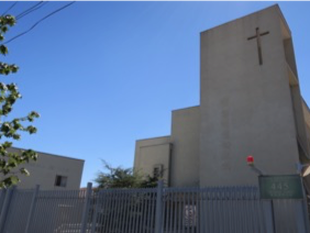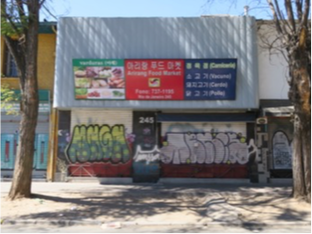|
|
|
Patronato is a well-known commercial neighbourhood in Santiago, Chile with a tradition of migrants’ settlement and entrepreneurship that dates back to the nineteenth century. Today, the area is branded as a textile and vibrant ‘multicultural commercial neighbourhood’, as read in several street signs. Traders and workers’ ancestries include Chilean, Korean, Chinese, Indian, Peruvian, Palestinian, Syrian, Haitian, Colombia and Venezuelan, among many others. Yet, despite its growing diversity, Patronato is often described (in the media, films and popular narratives) as a Palestinian-Korean neighbourhood.
In our Identities article, ‘Contested and interdependent appropriation of space in a multicultural commercial neighbourhood of Santiago, Chile’, we analyse memories, images and uses of space by entrepreneurs of Korean and Palestinian ancestry, as well as their competing and reciprocal appropriation of space. Through processes of social production and construction of space (Low 2017), we examine their experiences of making, inhabiting and appropriating space, in relation to the transformations of the political economy.
During fieldwork, we were surprised to see that a pervasive narrative of social replacement – depicted as a displacement of Palestinians generated by Koreans’ settlement – somehow concealed their visibly persistent coexistence in the daily life of the neighbourhood and, at the same time, omitted emerging processes of commercial interdependency. From here, firstly, our Identities article shows how processes of ethnicisation of space – popularly explained as given by ethnic differences and, as such, generating tensions among Palestinians and Koreans – respond to historical, economic and political shifts happening at a global and local level. Koreans and Palestinians were incorporated into the local economy and settled in Patronato (to then move to live in other areas of the city) in two crucial moments of the political economy:
Palestinians established themselves as textile entrepreneurs in the import substitution stage that begun in the 1930s. During this era, as happened in different countries worldwide, the State aimed to strengthen the local industry in the aftermath of the 1930s' Great Depression. By their side, Koreans settled in Patronato mostly in the 1980s. Since then, the importations started as part of a new stage in the political economy that, diminishing the presence of the State and facilitating the entry of overseas investors, pushed traders to compete in the global market. From here, a narrative of displacement and social ‘replacement’ from one period to the other predominates in Patronato. What emerges is a problematic narrative about the disruption of a previous (idyllic) way of living and golden age – a narrative that questions Koreans’ legitimate appropriation of the space. Patronato becomes invested with meanings and ethnically encoded via social practices, which are also economic, contextual and not necessarily cultural. Secondly, challenging the prism of inter-ethnic socioeconomic conflict and separation among migrant entrepreneurs, our Identities article also shows emerging dynamics of social interdependence and adjustment taking place alongside the reorganisation of ethnic boundaries. It shows that narratives that highlight contestation over space overlook new adjustments and interdependencies, and that forms of material attachment to a place can change. During our fieldwork, real-estate agents in the neighbourhood stated that properties were still mostly owned by people with a Palestinian background, with Koreans acting as their tenants. In this case, the common-sense idea that Palestinians had sold the place and that, after facing bankruptcy with the beginning of importations, had been displaced by Koreans, was not that accurate. Ownership and (un)availability of properties have reconfigured the relation among Palestinian and Koreans and their descendants, moving from competency in the textile industry to interdependency in the real-estate market. Beyond this particular case, illuminating the relationship between contestations and interdependencies, and unsettling the prism of ‘cultural differences’, is important. This is because the sole focus on tensions and differences, rather than on what migrant trajectories have in common, can mitigate potential solidarities and promote the persistence of prejudices. In this context, it is important to illuminate how inter-ethnic contestation is connected to the aggressive imposition of governmental programmes, which socially displace or unsettle some social groups in particular fields. Moreover, changes in business relations and in the local economy can arise, along with new interdependencies and the reorganisation of ethnic borders, and the re-ethnicisation of space. Crucially, this, rather than involving actual separation, allows individuals to organise their narratives of space and create a sense of continuity in a changing neoliberal city.
Blog post by Carolina Ramírez, Universidad de Chile, Chile and Carolina Stefoni, Universidad de Alberto Hurtado, Chile
Read the full article: Ramírez, Carolina & Stefoni, Carolina. Contested and interdependent appropriation of space in a multicultural commercial neighbourhood of Santiago, Chile. Identities: Global Studies in Culture and Power. DOI: 10.1080/1070289X.2019.1658394
0 Comments
Your comment will be posted after it is approved.
Leave a Reply. |
|
Explore Identities at tandfonline.com/GIDE |
|
The views and opinions expressed on The Identities Blog are solely those of the original blog post authors, and not of the journal, Taylor & Francis Group or the University of Glasgow.


